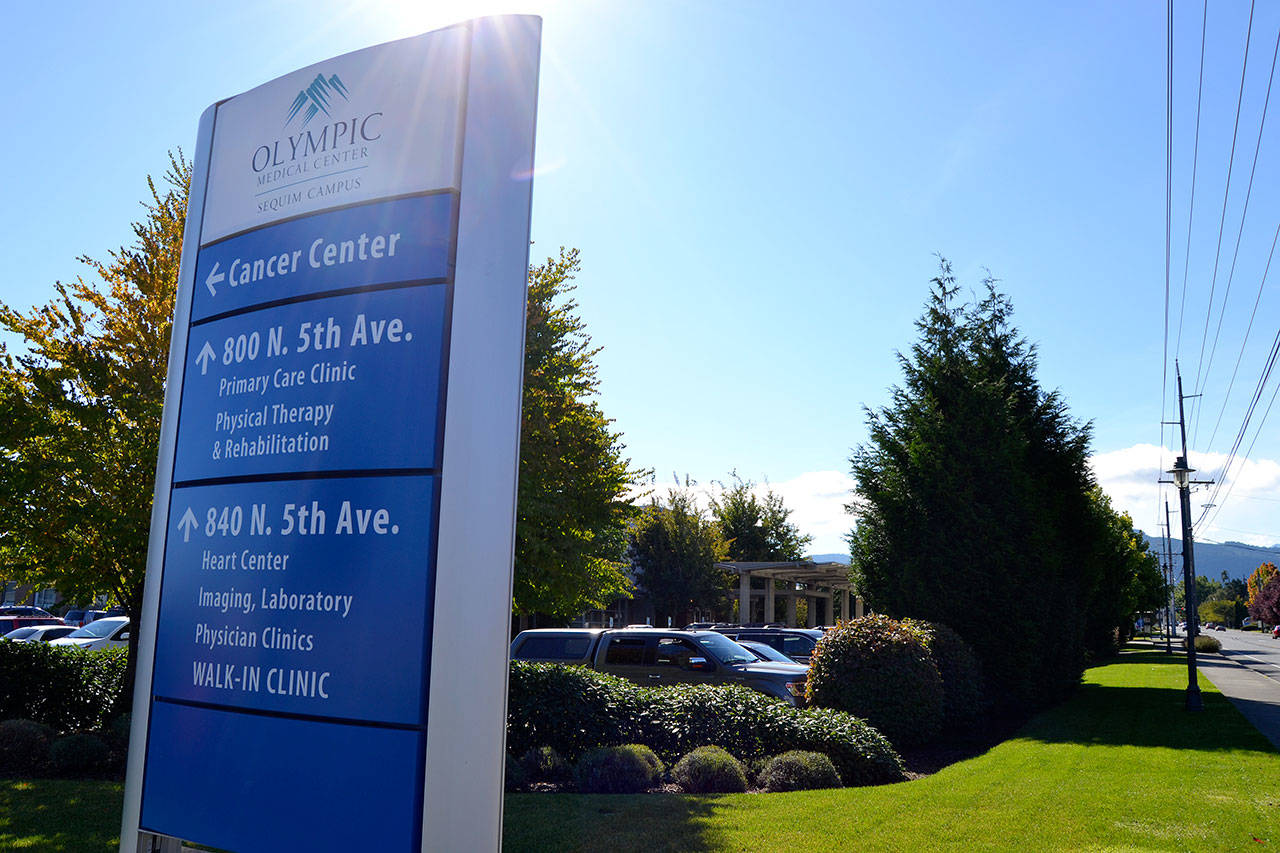Leaders with Olympic Medical Center urge people to comment on a Centers for Medicare and Medicaid Services proposal that could significantly cut reimbursements for the hospital’s off-site clinics, including Sequim.
The proposal will cost the public hospital $47 million over the next decade, local health leaders say.
OMC CEO Eric Lewis continues to meet with various community groups across Clallam County asking individual and group letters to stop the proposal and support rural hospitals.
“In my 30 years in health care, I’ve never seen a cut this big,” Lewis told Sequim City Councilors on Sept. 10.
“The cut is designed to eliminate services.”
For OMC, the cut would eliminate about $3.4 million in funding in 2019.
“This cut would affect the OMC Sequim campus for a long time,” Lewis said. “It’s very concerning.”
Lewis said in an interview with the Peninsula Daily News that proposed cuts from the Centers for Medicare and Medicaid Services’ would worsen the area’s shortage of health care providers and could increase visits to the emergency room.
The rules would reduce OMC’s expense reimbursement from $118.35 per visit to $47.34 per visit — a 60-percent cut — at its off-site clinics.
A letter from OMC leaders to Centers for Medicare and Medicaid Services asks the agency not to implement “site neutral payment cuts to off-site hospital outpatient departments more than 250 yards from a hospital because this policy change will destabilize rural health care delivery systems and substantially harm OMC and our local community.”
The letter also asks if cuts implemented anyway to exclude rural hospitals, because those facilities must spread their services out to reach a wider geographic area.
OMC officials say Medicare patients in Clallam County make up about 60 percent of the hospital’s patients, with about 12,000 Clallam County residents enrolled.
At off-site clinics — which are clinics that are more than 250 yards away from the hospital’s main campus — the percentage of Medicare patients varies, Lewis said.
“Some, it’s as high as 80 (percent) and 90 percent,” he said.
Sequim’s campus currently hosts the Olympic Medical Cancer Center, which saw nearly 13,000 patient visits in 2017, the Specialty Clinic (about 13,400 visits), Olympic Medical Sleep Center (about 3,300 visits), Orthopaedic Clinic (about 6,400 visits), Primary Care Clinic (about 9,000 visits) and Walk-In Clinic (nearly 10,000 visits).
OMC’s letter states that expansion plans in Sequim, including the cancer center, were made with an understanding that the hospital was grandfathered in under current reimbursement rates.
Lewis told city councilors that OMC receives about 85 percent reimbursement for Medicare, but any new services under the proposal would see the new reimbursement rate.
“OMC needs to be adding more services, not fewer,” Lewis said. “With a 60 percent cut, it just won’t be financially viable.”
Reimbursements
Hospitals are reimbursed significantly more per visit than private practice physicians.
The Centers for Medicare and Medicaid Services said in its proposal that in many cases hospitals have purchased private-practice clinics and then offered the same services that had been offered before. For that reason, the agency has proposed reducing hospital reimbursements.
“We have heard that many off-campus departments converted from physicians’ offices to hospital outpatient departments, without a change in either the physical location or a change in the acuity of the patients seen,” the Centers from Medicare and Medicaid Services said in its proposal.
“To the extent that similar services can be safely provided in more than one setting, we do not believe it is prudent for the Medicare program to pay more for these services in one setting than another.”
Lewis said the hospital has more regulations than private care providers, and unlike private practice Olympic Medical Center is required to provide care to Medicare patients.
“We also take every patient regardless of ability to pay,” he said in a PDN interview. “Freestanding physicians don’t have to do that.”
The government is assuming there are private practice physicians that would see OMC’s patients, Lewis said, but that isn’t the case.
There is a shortage of health care providers on the North Olympic Peninsula, in part because of the low reimbursement rate for private practice physicians, he said.
Congress in 2015 protected the existing clinics by grandfathering them in under these rules.
“This is really going against what that law did,” Lewis said.
Lewis told city councilors efforts to propose cuts began in 2008 and recently resurfaced despite both the house and senate voting to grandfather in existing clinics in 2015.
He told city councilors comment letters speak volumes with the Centers for Medicare and Medicaid Services.
“I think if we ask for them to do this with rural hospitals, there’s a good chance they won’t implement this,” Lewis said.
“CMS needs to hear that Sequim absolutely needs these services.”
Sequim city councilors unanimously approved drafting a letter in support of OMC and rural hospitals.
Commenting
Comments on the proposal are due by Sept. 24.
Learn more at www.olympicmedical.org/ProtectLocalHealthCare.
To comment on the proposed regulations, visit regulations.gov or mail written comments to: Seema Verma, Administrator, Centers for Medicare & Medicaid Services, Department of Health and Human Services, Attention: CMS-1695-P, P.O. Box 8013, Baltimore, MD 21244-1850.
OMC hosts a public forum at 5 p.m. Thursday, Sept. 20, in its Medical Services Building in the second floor conference room, 840 N. 5th Avenue, Sequim.
Matthew Nash contributed to this report.
Jesse Major is a reporter with the Olympic Peninsula News Group, which is composed of Sound Publishing newspapers Peninsula Daily News, Sequim Gazette and Forks Forum. He can be reached at 360-452-2345, ext. 56250, or at jmajor@peninsuladailynews.com.



